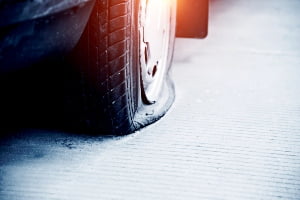 Tire maintenance plays a crucial role in preventing blowouts and helping you maintain control of your vehicle out on the road. Old or underinflated tires are at higher risk for blowing out or not maintaining traction on the road. This can cause your vehicle to spin out of control into another vehicle or stationary object.
Tire maintenance plays a crucial role in preventing blowouts and helping you maintain control of your vehicle out on the road. Old or underinflated tires are at higher risk for blowing out or not maintaining traction on the road. This can cause your vehicle to spin out of control into another vehicle or stationary object.
In this blog, our knowledgeable Lafayette-based auto accident lawyers explain the importance of tire maintenance in preventing accidents. We also discuss how the different seasons can have an impact on the performance of your tires.
Our lawyers have been helping Louisiana crash victims secure compensation for decades. There are no upfront costs for our legal services, and our clients do not pay unless they receive compensation.
Call our office to schedule a FREE case review. Turning Wrong Into Right. 337-984-8020
How Can Worn-Out Tires Cause an Accident?
Worn-out tires can significantly increase the risk of a car crash. Tires in this condition have reduced stability and traction, which makes the vehicle harder to control.
Here are some of the ways older tires can cause a dangerous collision:
- Skidding and sliding: Decreased traction can lead to skidding and sliding in extreme weather conditions like rain, snow or ice.
- Hydroplaning: This occurs when a layer of water builds up between the tire and the road, causing a vehicle to slide uncontrollably.
- Blowouts and rapid deflation: A sudden loss of tire pressure can cause drivers to lose control of the vehicle.
- Decreased stability: Worn-out tires can make you more likely to lose control when you are turning or navigating a curve in the road.
- Uneven wear and mechanical issues: Worn-out tires can cause uneven wear, which can make wheel alignment problems even worse.
How Can the Weather Impact Your Tire Maintenance?
Severe weather impacts your tire pressure. For example, extreme heat can cause the air inside your tires to expand. Consequently, tires can overinflate and may be at a higher risk of a blowout.
Other weather conditions that can affect your tires include:
- Cold temperatures that can decrease tire pressure, causing uneven or increased tire wear.
- Snow and ice can cause tire rubber to harden, reducing its ability to adapt to the road surface.
Who Is Liable for Tire-Related Car Crashes?
Tire-related car crashes can happen for various reasons. That is why more than one party could be liable for the collision.
Below, we discuss the parties often held liable for tire-related collisions:
Vehicle Owner
The vehicle owner could be liable if he or she failed to maintain the tires. For example, not rotating or replacing worn-out tires can make the vehicle owner responsible for damages. It is up to the vehicle owner to visually inspect their car to detect signs of cracks, punctures or uneven tread wear.
Tire Manufacturer
Manufacturers are responsible for making safe products. If tires are defective or have a faulty design, the manufacturers could potentially be held liable for a car crash, blowout or other tire-related issues.
What Steps Can Vehicle Owners Take To Maintain Their Tires?
Tires typically last four to five years. After six years, tires often need to be replaced. The life of a tire often varies based on factors such as climate, maintenance and driving habits.
Here are some steps that vehicle owners can take to maintain their tires:
- Check tire pressure regularly and reinflate as necessary.
- Rotate tires and have your alignment checked.
- Use a tread depth gauge to ensure tires have adequate grip.
- Use winter tires to improve traction in snow and ice.
- Avoid aggressive driving to prevent tire wear.
Many drivers are unsure about their ability to check tire pressure or reinflate their tires as necessary. Fortunately, you can bring your car to a trusted mechanic or repair shop. Repair shops will often do a tire pressure check and add air at little to no cost.
An alignment is something you are going to have to pay for. However, this is not something you will need to do often. Follow your vehicle’s maintenance schedule. If you notice the steering wheel vibrating more than usual, it could be a sign you need an alignment. It could also be a sign of a bubble in your tire. These are issues to get checked out by a licensed mechanic.
Contact Galloway Jefcoat After a Tire-Related Car Crash
If you are unsure about what steps to take after a car crash, you should speak to an experienced lawyer who can determine your legal options and calculate all your damages, injuries and other losses.
Galloway Jefcoat has been securing compensation for vehicle crash victims for many years. We have the experience and legal knowledge to manage the legal process on your behalf, and there are no upfront costs.
Call our office to discuss your potential case. 337-984-8020